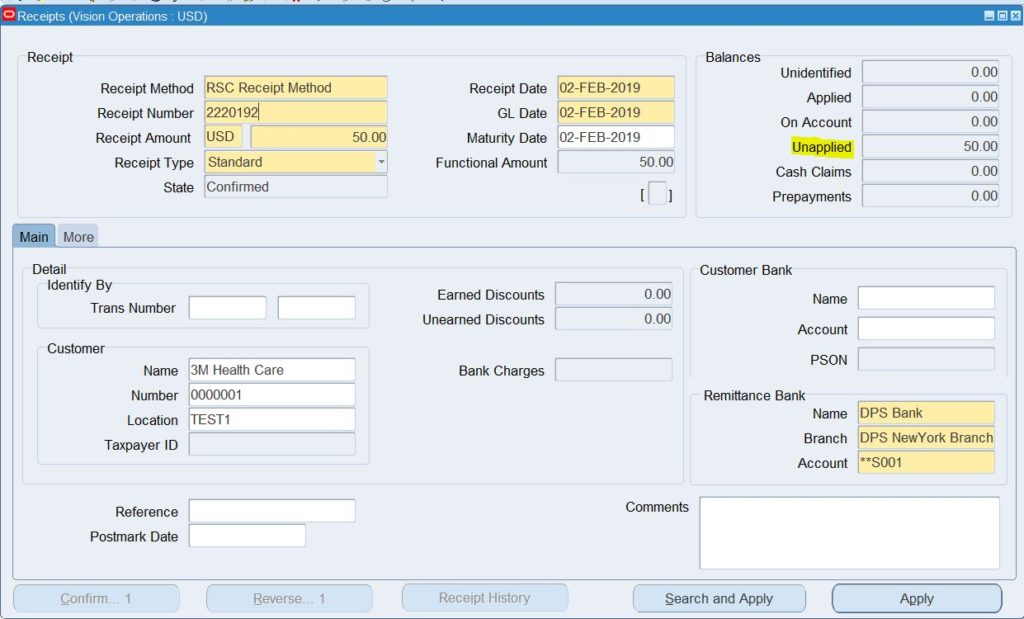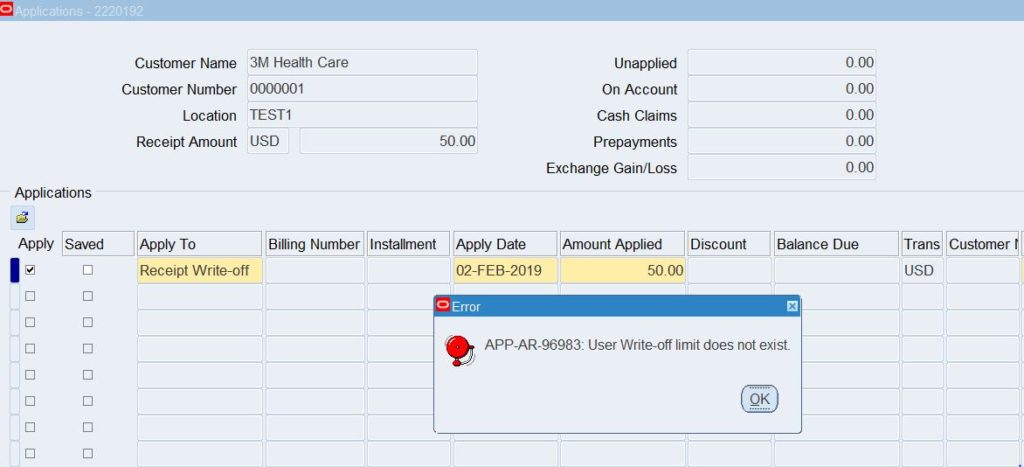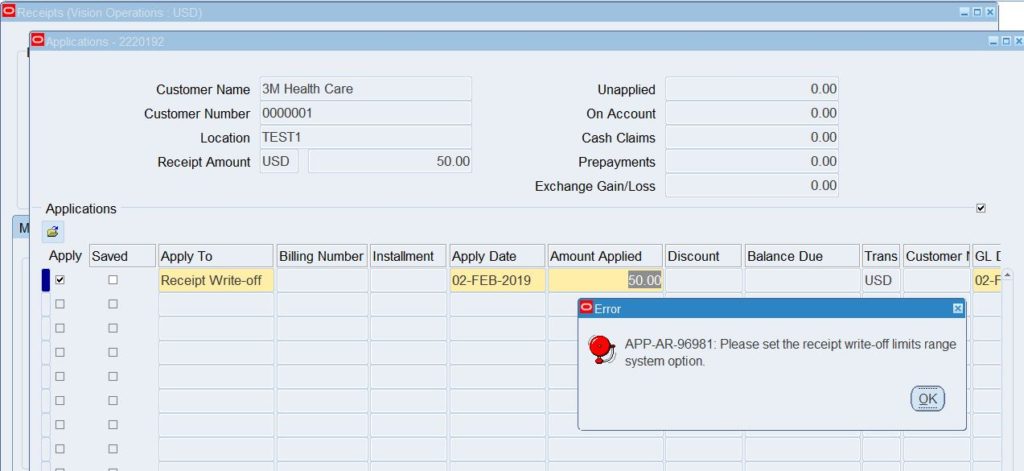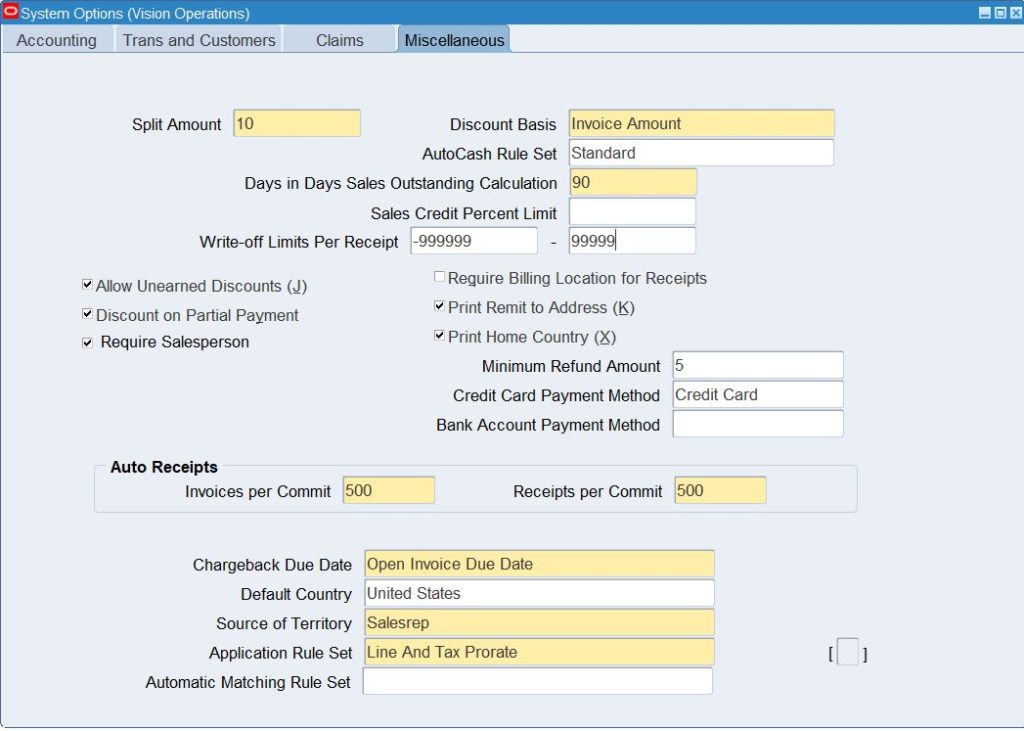The following post can be used to create a Cash receipt in Oracle Receivables. The “ar_receipt_api_pub.create_cash” SQL API is used to create cash receipts for the payment received in the form of a check or cash. Cash receipts can be created as identified (with a customer) or as unidentified (without a customer).
DECLARE
l_return_status VARCHAR2 (1);
l_msg_count NUMBER;
l_msg_data VARCHAR2 (240);
p_count NUMBER := 0;
l_cash_receipt_id ar_cash_receipts_all.cash_receipt_id%TYPE;
l_user_name fnd_user.user_name%TYPE := 'PADIVI';
g_user_id fnd_user.user_name%TYPE;
l_resp_id fnd_responsibility.responsibility_id%TYPE;
l_appl_id fnd_application.application_id%TYPE;
l_ou_id hr_operating_units.organization_id%TYPE;
l_receipt_method_id ar_receipt_methods.receipt_method_id%TYPE;
BEGIN
-- Get User ID
BEGIN
SELECT user_id
INTO g_user_id
FROM fnd_user
WHERE user_name = l_user_name;
EXCEPTION
WHEN OTHERS
THEN
DBMS_OUTPUT.put_line (
'Error during deriving User ID and error is: ' || SQLERRM);
END;
--Get Responsibility ID
BEGIN
SELECT RESPONSIBILITY_ID
INTO l_resp_id
FROM fnd_responsibility
WHERE responsibility_key = 'RECEIVABLES_MANAGER'; --- enter the responsibility name that has access to create Invoices
EXCEPTION
WHEN OTHERS
THEN
DBMS_OUTPUT.put_line (
'Error during deriving Responsibility ID and error is: '
|| SQLERRM);
END;
--Get Application ID
BEGIN
SELECT application_id
INTO l_appl_id
FROM fnd_application
WHERE application_short_name = 'AR';
EXCEPTION
WHEN OTHERS
THEN
DBMS_OUTPUT.put_line (
'Error during deriving application ID and error is: '
|| SQLERRM);
END;
-- Get Organization ID for that Operating Unit
BEGIN
SELECT organization_id
INTO l_ou_id
FROM hr_operating_units
WHERE name = 'p_ou_name';
EXCEPTION
WHEN OTHERS
THEN
DBMS_OUTPUT.put_line (
'Error while deriving Operating Unit ID and error is: '
|| SQLERRM);
END;
-- Get Receipt Method Id
BEGIN
SELECT RECEIPT_METHOD_ID
INTO l_receipt_method_id
FROM AR_RECEIPT_METHODS
WHERE NAME = 'p_receipt_method'; -- Enter receipt method here.
EXCEPTION
WHEN OTHERS
THEN
DBMS_OUTPUT.put_line (
'Error while deriving Operating Unit ID and error is: '
|| SQLERRM);
END;
mo_global.init ('AR');
mo_global.set_policy_context ('S', l_ou_id);
fnd_global.apps_initialize (user_id => g_user_id,
resp_id => l_resp_id,
resp_appl_id => l_appl_id);
ar_receipt_api_pub.create_cash (
p_api_version => 1.0,
p_init_msg_list => fnd_api.g_true,
p_commit => fnd_api.g_true,
p_validation_level => fnd_api.g_valid_level_full,
x_return_status => l_return_status,
x_msg_count => l_msg_count,
x_msg_data => l_msg_data,
p_currency_code => 'USD',
p_amount => 105, -- Pass the Receipt Amount
p_receipt_number => 'Test Rcpt 101', -- Pass the Receipt Number
p_receipt_date => SYSDATE,
p_gl_date => '30-NOV-2018',
p_customer_number => 'p_customer_number', -- Account number of the Customer against whom the Receipt is being created for. Hz_cust_accounts.account_number
p_receipt_method_id => l_receipt_method_id,
p_cr_id => l_cash_receipt_id);
DBMS_OUTPUT.put_line (
'API Return Status is - '
|| l_return_status
|| ' and l_msg_count is - '
|| l_msg_count);
DBMS_OUTPUT.put_line ('Cash Receipt id is - ' || l_cash_receipt_id);
IF l_msg_count = 1
THEN
DBMS_OUTPUT.put_line ('Error Message is - ' || l_msg_data);
ELSIF l_msg_count > 1
THEN
LOOP
p_count := p_count + 1;
l_msg_data :=
fnd_msg_pub.get (fnd_msg_pub.g_next, fnd_api.g_false);
IF l_msg_data IS NULL
THEN
EXIT;
END IF;
DBMS_OUTPUT.put_line (
'Message ' || p_count || '. ' || l_msg_data);
END LOOP;
END IF;
END;
/




